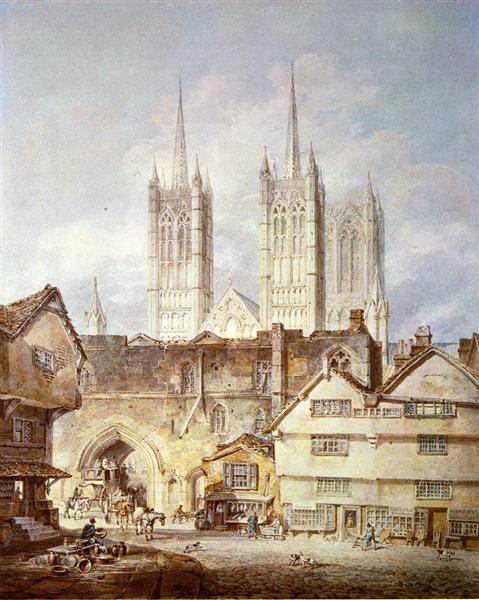Kuvaus
Joseph Mallord William Turnerin teos "Lincolnin katedraalin kirkko" (1795) on kiehtova esimerkki taiteilijan hallinnasta maiseman ja arkkitehtuurin yhdistelmässä. Turner, joka tunnetaan kyvystään vangita valoa ja ilmapiiriä, osoittaa tässä maalauksessa teeman, joka resonoi Ison -Britannian kulttuurin sydämessä: historiallisen arkkitehtuurin grandiositeetti ja kunnioitus suhteessa luonnolliseen ympäristöön.
Teoksen koostumus esittelee maisemaa hallitsevan Lincolnin katedraalin, joka visualisoidaan dynaamisen tasapainon hetkessä kiven ja taivaan välillä. Vaikka katedraali itsessään on upea esimerkki englantilaisesta goottilaisesta, Turner kuvaa sitä täällä paitsi suuren arkkitehtonisen merkityksen rakenteena, myös elementtinä, joka sulautuu ympäröivään maisemaan, hämärtäen linjan luonnollisen ja rakennuksen välillä. Taivaallisten ja maallisten elementtien yhdistelmä viittaa henkiseen yhteyteen, joka on yksi maalarin teoksen vakioista.
Värin käyttö on yksi Turnerin erottuvimmista piirteistä tässä työssä. Paletti koostuu pehmeistä sävyistä ja hienoista siirtymistä, mikä luo melkein eteerisen vaikutuksen. Taivaan siniset ja harmaat sävyt ovat ristiriidassa katedraalin lämpimien vivahteiden kanssa, jotka näyttävät säteilevän heidän omaa kirkkautta. Tämä tekniikka ei vain korosta katedraalia koostumuksen keskeiseksi painopisteeksi, vaan myös herättää majesteettin ja suuruuden tunteen, kääntäen siten kunnioituksen ja hämmästyksen, jonka katsoja voi kokea harkittaessa katedraalia tosielämässä.
Koko työn ajan ihmishahmoja voidaan havaita pohjassa, mikä mahdollisesti edustavat seurakunnan jäseniä tai matkustajia, jotka harkitsevat majesteettista rakennetta. Nämä merkit eivät kuitenkaan ole huomion keskipiste; Pikemminkin ne liuentaan maisemassa, mikä vahvistaa katedraalin hallinnan. Tämä lähestymistapa toistaa ajan romanttisen ihanteen, jossa ylevään yksilöllinen kokemus on korotettu, mikä heijastaa myös ihmisen suhdetta luonnon ja historian suuruuteen.
Turnerille, jota pidetään impressionismin edeltäjänä, on ominaista värien ja valon käyttäminen tunteiden ja mielialojen ilmaisemiseen sen sijaan, että se vain edustaisi todellisuutta suoraan. Tämä kutsuu katsojan suorittamaan emotionaalisen, mietiskelevän ja melkein transsendenttisen kokemuksen tarkkailemalla hänen työtä. "Lincolnin katedraalin kirkko" on tässä ilmeikäs kehys, joka osoittaa, kuinka historiallinen arkkitehtuuri voi herättää syviä tunteita olemalla sopusoinnussa sen ympäristön kanssa.
Turnerin uran yhteydessä tämä maalaus on osa ajanjaksoa, jolloin se pyrki vangitsemaan Englannin symbolisten paikkojen olemuksen, vastakohtana sen juuriin maan muuttuvan nykyaikaistamisen kanssa. Turnerin kiinnostus erityisesti katedraaleihin voidaan nähdä myös muissa teoksissa, kuten hänen edustuksensa Yorkin katedraalissa, joka korostaa hänen sitoutumistaan ja kiehtovuutta aikansa kulttuuriseen ja arkkitehtoniseen vaurauteen.
Tällä työllä Turner ei vain dokumentoi fyysistä paikkaa, vaan kutsuu myös syvemmälle henkisyyden, historian ja luonnon välisestä suhteesta löytämällä ainutlaatuisen tasapainon, joka edelleen resonoi katsojien keskuudessa, kääntäen "kirkon Lincolnin katedraalia" kestävänä Työskentely brittiläisen taiteen kaanonissa.
KUADROS ©, kuuluisa maali seinällesi.
Käsivalmistetut öljymaalaukset, ammattitaiteilijoiden laadun ja erottuvan sinetin kanssa KUADROS ©.
Kuvien jäljennöspalvelu tyytyväisyystakuu. Jos et ole täysin tyytyväinen maalauksen jäljennökseen, palautamme rahasi 100%.

